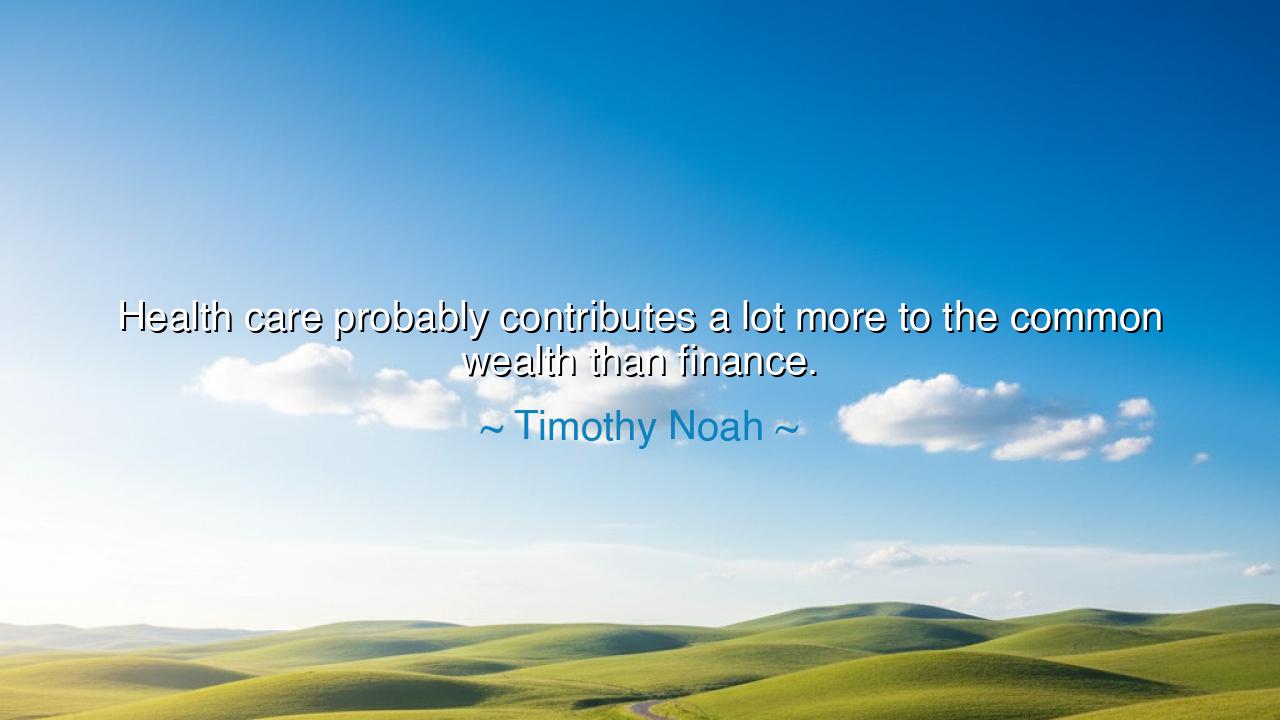
Health care probably contributes a lot more to the common wealth






The words of Timothy Noah — “Health care probably contributes a lot more to the common wealth than finance” — strike like a quiet thunder through the noise of modern civilization. In this age where nations measure greatness by coins and markets, Noah reminds us that the true wealth of a people is not gold, but the strength of their bodies, the steadiness of their hearts, and the clarity of their minds. Finance may build empires of stone and glass, but health care builds the living empire of humanity. For what good is fortune, if the hands that hold it tremble with sickness, or the eyes that gaze upon it are dulled by suffering?
In the ancient days, before the rise of ledgers and stock exchanges, the wise already knew this truth. The healers, not the merchants, were the guardians of civilization. The Egyptians revered their physicians as servants of the gods. The Greeks raised temples to Asclepius, god of healing, where those afflicted would lie among serpents and dream of restoration. Even in the East, the emperors of China kept their doctors not for curing illness, but for maintaining balance, rewarding them only when no disease took root in the palace. For these ancients understood: the health of one is the health of all, and the prosperity of a nation begins in the well-being of its people.
In contrast, finance, though powerful, often serves the few. It gathers numbers and multiplies wealth, but rarely multiplies happiness. It builds towers, yet forgets the weak who dwell in their shadows. When greed rules, money flows upward, but life flows outward — and the world below grows barren. Health care, however, flows in every direction. The nurse who tends to a stranger, the surgeon who restores a broken limb, the scientist who discovers a vaccine — they add to the common wealth, the invisible treasury of human vitality and compassion. Their work enriches not one, but all.
Consider the story of Florence Nightingale, the Lady with the Lamp. Amid the blood and filth of the Crimean War, she walked through the night tending to wounded soldiers. Her devotion reduced death rates, restored hope, and laid the foundation for modern nursing. Did she accumulate riches? No. Yet the wealth she created — in lives saved, in suffering relieved, in systems reformed — outshone the fortune of kings. Her legacy proves Noah’s truth: the healer’s touch yields more lasting prosperity than any banker’s pen.
Health care is the living heart of a nation. It turns compassion into policy, knowledge into mercy, and skill into salvation. Every act of healing strengthens the foundation of civilization. When citizens are healthy, they can learn, labor, create, and dream. When illness dominates, even the richest nation becomes poor. For wealth that cannot buy health is but an illusion — a golden cage around a dying bird.
Noah’s words, then, are not an argument against finance, but a plea for perspective. Money measures exchange, but health measures existence. Finance sustains markets; health sustains mankind. The banker may keep accounts, but the healer keeps souls alive. True balance lies in remembering that the pulse of the economy must always follow the pulse of humanity — never the other way around.
So let the nations of tomorrow heed this ancient wisdom: invest first in life, and life will reward you with abundance. Build hospitals before stock exchanges, train healers before traders, and measure prosperity not by profits, but by the laughter of children, the strength of the old, and the peace of the infirm restored. For the truest wealth is not stored in vaults, but beating in the hearts of the living.
Thus, my child, when you weigh the value of your own labor, remember this sacred truth: what you give to another’s health — in care, in kindness, in understanding — enriches not only them, but the entire world. That is the eternal economy of compassion, and its dividends never run dry.






AAdministratorAdministrator
Welcome, honored guests. Please leave a comment, we will respond soon